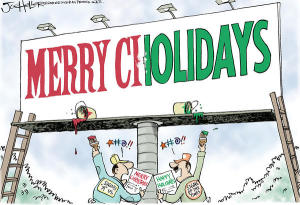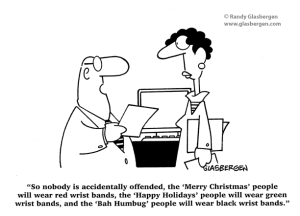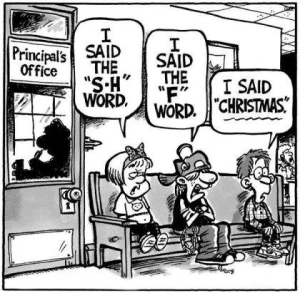I have used the phrase ‘Merry Christmas,’ even as early as November, but recently controversy regarding this saying and other Christmas related traditions has arisen. Mainly that Christmas’ catch phrase is uninclusive of other end-of-the-year holidays such as Hanukkah and Kwanzaa. In place of the term ‘Merry Christmas’ the government and many businesses have begun to use ‘Happy Holidays’ or ‘Seasonal Greetings’ in an effort to be more embracing of the other celebrations of the same time.
While a small change, this adjustment shows part of the long stride towards belief-based (religion, or lack thereof) equality that has been made. While a separation between church and state is far in the future, the public acceptance of multiple religions and traditions is huge for the development of humankind. However, whether you are Atheistic, Agnostic, Christian, Jewish, Muslim, Hindu, Animist, Mormon, or an adherent from any other religion or non-religion, you have the right to any belief, and the practices that accompany it. No one gets on your case for saying ‘Happy Hanukkah’, so why should you be admonished for wishing another ‘Merry Christmas’? Right? Maybe not.
This compromise is an admirable effort to be more inclusive of the other year-end holidays, it would be interesting to see, however, how offended people really feel because of it. But wait, you can. Studies taken in Rhode Island show that 51% of those living in the D.C. Metro area prefer ‘Merry Christmas’, while only 36% prefer ‘Happy Holidays’. This of course, doesn’t justify anything.
I understand why people are becoming upset, I do get it. If I were a strong believer of any religion, it is likely I would be taken aback by the amount of Christmas related ornamentation and traditions that go up in November and December. Public spaces are drowned by green and red signs and decorations; myriads of small, flashing lights; and Christmas music, which is played everywhere. It ends up being a very in-your-face season, which may be uncomfortable for some, but I see no reason to patronize people for their festivities, even if mine aren’t being recognized.
While we should be careful not to cause offense to people, it should not be necessary to alter our customs to accommodate people with differing religious view and customs. We should’t be afraid of offending someone just by wishing them a good holiday season. Bottling up problems does not solve anything, Anybody should be able to publicly celebrate any holiday they wish.
However, employing the phrase ‘Happy Holidays’ in work places, businesses, and other public areas is respectful to other religions — or non-religions — regardless if it is offensive. An individuals freedom to wish you a ‘Happy Insert Holiday Here” shouldn’t be restricted, though. The gracious thing to do is accept that they care and reciprocate by saying “and you as well”.
Christmas is a huge holiday in the United States. And while it was Christian it has morphed into a much more cultural holiday than a religious one. My family of non-believers celebrates it every year. We say ‘Merry Christmas’ too. The market has capitalized on consumer weakness during this time of merriment without regard to other festivities that occur at the same time.
There is nothing wrong with wishing a Jewish person ‘Merry Christmas’, just as there is nothing wrong with a Jewish person wishing me ‘Happy Hanukkah’. People believe in different things, that should not be an issue. If you celebrate one holiday, while someone else celebrates another, you are not obligated to use their holiday’s catch phrase. Just be respectful of their choices.
So next time you say ‘Merry Christmas’ consider adding ‘Happy Hanukkah’, ‘Happy Kwanzaa’, ‘Happy Pancha Ganapati’, ‘Happy Yule’, ‘Happy HumanLight’, ‘Merry Newtonmas’, ‘Happy Hogswatch’, and ‘Happy Festivus’, or just politely say what you or they celebrate. And if you’re on the receiving end of a seasonal greeting of this sort, just accept it, it means they care enough to wish you a happy holiday.



